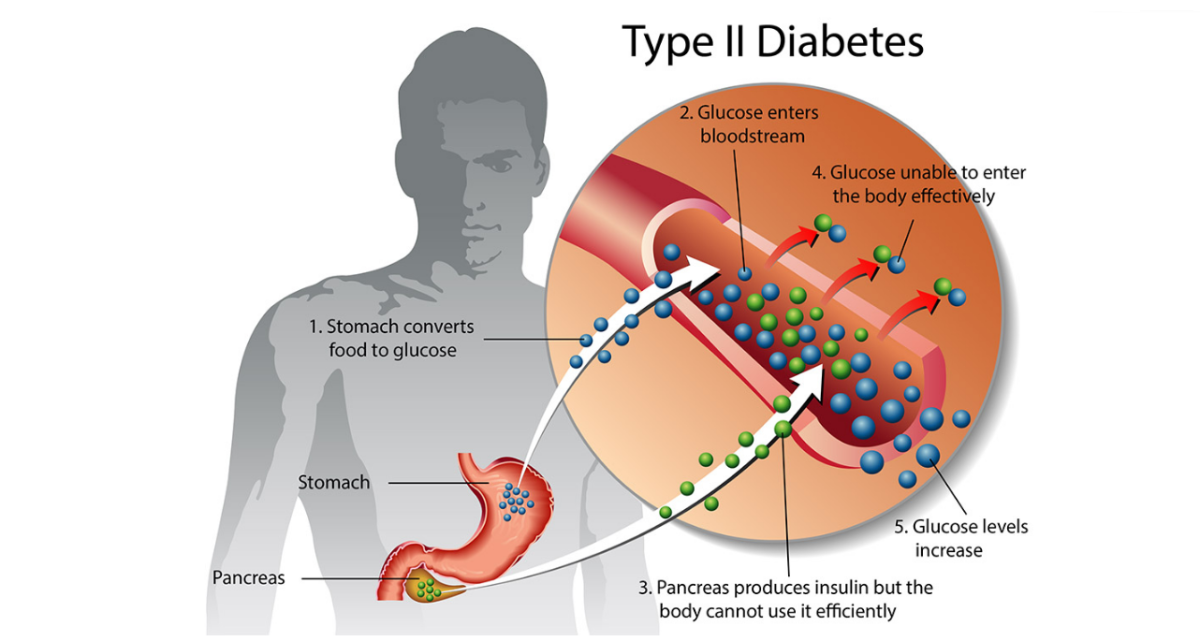Diabetes Mellitus In Dogs

Introduction
Diabetes mellitus in dogs is caused by a lack of, or less commonly resistance to insulin, a hormone produced in the pancreas. Insulin allows the body's cells to take up glucose (a sugar produced in digestion). These cells can then use glucose to provide energy for cellular functions. A lack of insulin therefore results in very high levels of glucose in the blood. The body is forced to rely on breaking down fat and protein to provide energy, leading to weight loss and potentially ketosis (an emergency condition resulting from excess breakdown of fat).
Causes
In most cases, diabetes in dogs is caused by destruction of the pancreatic cells which manufacture insulin. This is usually the result of an auto-immune process (in which the body attacks its own cells) or can occur in animals which have suffered chronic pancreatitis or pancreatic inflammation. Less commonly, diabetes can be caused by insulin resistance due to obesity or hormonal factors (within a few weeks of a female dog being in heat).
Canine diabetes is always type 1 diabetes mellitus, i.e. insulin dependent; all diabetic dogs will require insulin treatment. An exception is that 20% of bitches who develop diabetes following estrus may be cured by prompt ovariohysterectomy/neutering.
Signs of Diabetes
Clinical signs of diabetes include the following; however, many diabetics may appear well in the early stages of disease.
- Increased thirst
- Urinating in the house (urine may be very strong-smelling as most diabetics not on treatment will have urinary tract infection)
- Weight loss in spite of normal or increased appetite
- Vomiting (if in ketoacidosis- emergency!!)
- Dehydration
- Lack of energy
- Cataracts (whitish opacity in the lens of the eye)
Diagnosis
Most cases of diabetes mellitus are relatively easy to diagnose. The clinical signs and history are usually very suggestive. However, some laboratory work is required to confirm the diagnosis and to rule out other coexisting conditions (interestingly, diabetes can occur in combination with other hormone deficiencies such as hypothyroidism and Addison's disease). Blood tests will be used as part of the investigation and will reveal high blood glucose as well as elevated cholesterol and liver enzymes in most cases. Urine analysis will show high levels of glucose and usually infection. More advanced blood testing is sometimes required; fructosamine and glycosolated hemoglobin give a longer-term measure of blood glucose but are more useful in monitoring than diagnosing this disease.
N.B.: Diabetes mellitus can be defined as high blood glucose with high urine glucose levels. If glucose is not present in one or other fluid your pet does not have diabetes. I have seen veterinarians make the mistake of diagnosing a dog as diabetic on the basis of high blood glucose alone. High blood glucose in isolation can occur with other conditions such as Cushing's disease.
Treatment & Monitoring
As stated above, diabetes in the dog is insulin-dependent. Once a diagnosis is made, your veterinarian will start your pet on once or twice daily insulin injections. Giving the injection is quite straightforward, and although many owners initially find the process very daunting it does get much easier very quickly. The needles and syringes used are tiny and most animals do not even feel the needle prick (see video below). In fact, because your dog will start to associate his/her insulin injections with feeding time, many are delighted to see their owner produce the insulin from the fridge!
It may take some weeks to stabilise your pet, but most diabetics do become well managed on treatment. The stabilisation process will require follow up blood and urine tests, some of which are usually carried out at home. Ongoing monitoring is vital, and you must keep in contact with your veterinary surgeon for the rest of your dog's life in order to keep him/her healthy. Most vets will ask you to keep a daily log of your pet's food, exercise, weight, water intake, and to monitor urine glucose levels regularly using dipsticks- available from Amazon. However, the prognosis for most diabetic dogs is excellent once stabilised and the benefits of treatment are well worth the effort.
- Pet Diabetes
Managing your dog or cat’s diabetes will require some effort, but the rewards are well worth it. - Monitoring Your Diabetic Pet at Home









